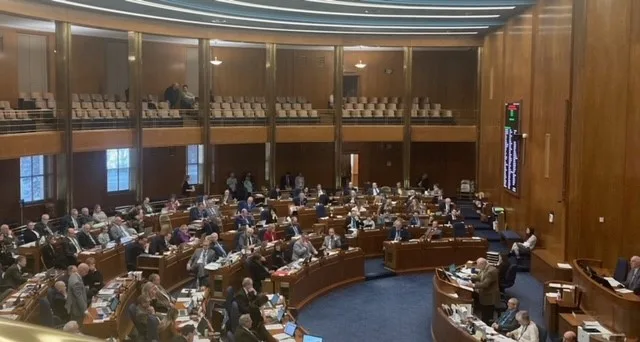

BISMARCK – The legislature might spend five million dollars to tear down buildings after the North Dakota State House considered a bill from the Senate Thursday.
Senate Bill 2026, if passed, would appropriate one time funding of $5 million dollars, or however much may be necessary, to the Department of Health and Human Services to demolish unused buildings on the state hospital campus in Jamestown. The buildings include the administrative and employee buildings, associated tunnels, milk and pig barns, and water treatment plant buildings.
SB2026 was introduced by legislative management at the request of the Acute Psychiatric Treatment committee. The bill received a Do Pass recommendation from the Human Services committee by a vote of 13 to 0.
“You’ll see there’s an emergency clause that’s placed on there, that is so that as soon as these weekend storms stop, the demolition construction can get started,” said the bill carrier, Rep. Gretchen Dobervich, D-Dis. 11, Fargo.
Dobervich said the amount of dollars in the bill came from the fiscal note created by the DHHS which was based on similar projects.
“If we’re going to appropriate $5 million to tear down a pig barn, dairy barn, a dairy barn I know could be reused, it could possibly be resold,” said Rep. Craig Headland, R-Dis. 29, Montpelier. “I think appropriating $5 million means we’re going to spend $5 million tearing down these buildings. I think it’s too much and I think we should defeat the bill.”
“These buildings have deteriorated to the point that this discussion has been ongoing for several years,” said the chairman of the Human Services committee, Rep. Robin Weisz, R-Dis. 14, Hurdsfield. “High levels of asbestos, water damage, etcetera, etcetera. This isn’t just one shed that we’re going to get rid of. We truly have reached the point where it has to get done.”
Weisz said the House recently voted to re-refer the bill to the Appropriations committee, and he isn’t sure how the bill got to the floor at that point.
The House then voted to remove SB2026 from the 14th order and re-refer the bill to the Appropriations committee.
The bill received a unanimous vote of approval from the Senate January 25.